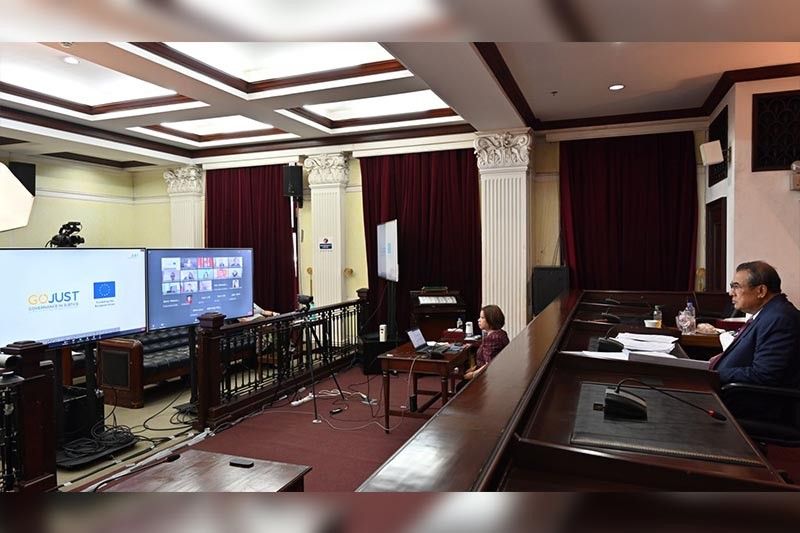Focus on human rights cases, making justice more accessible in coming years at the Judiciary

MANILA, Philippines — Prioritizing human rights cases and making justice more accessible to the marginalized and underserved are on the roadmap of justice reform in the next four years among the Philippine justice and law enforcement sectors.
The European Union, in partnership with the Philippine Government, launched on Thursday the second phase of its Justice Sector Reform Programme: Government in Justice (GoJUST Programme), where the Supreme Court and the Departments of Justice and the Interior and Local Government presented projects in the next four years.
The EU has committed 19 million Euros or P1.1 billion for the second phase of the Government in Justice programme (GoJUST) for this period, it said in a release.
First launched in 2017, the government’s new reform program was able to open seven Justice Zones in Quezon City, Cebu City, Angeles City, Davao City, Bacolod, Naga City and Calamba City.
During the pandemic, GoJUST said they were able to strengthen the e-Dalaw system, which allowed Persons Deprived of Liberty to remain in contact with their families and counsels, albeit virtually, amid prison lockdown.
The program also helped prosecution offices and court decongest their dockets.
Access to justice
Chief Justice Alexander Gesmundo, who delivered the keynote address at the launch, said the next five years will be crucial to the Judiciary. “The plans, activities and programs embraced in the Strategic Plan form a cohesive framework envisioned and dedicated to re-molding and transforming our courts into consistently efficient and accountable haves for the disadvantaged, the wronged, the injured,” he said.
The pandemic has accelerated the Judiciary’s quest for digital transformation, the chief justice said. Courts were forced to close their premises but ensure their accessibility by operating electronically and holding videoconference hearings.
In the coming years, Gesmundo said the Judiciary will “ensure 24/7/365 access to court and case-related information and services. Access to court services should not be limited to face-to-face access, especially in this time of pandemic.”
“Free and no expense access through electronic or digital means, including social media will widen the reach of court services and bridge the gap in information between the public and the courts, and hopefully provide our people with a legitimate source of help when confronted with legal issues requiring court intervention,” he said. The Judiciary will also launch social media Access to Justice info.sites with easily understandable information on court services and access to them.
Gesmundo also said they will “prioritize the development of the Philippine Judiciary [Information and Communication Technology] Governance Framework, the ICT Strategic Plan, and the MIS Operations Manual to ensure that we are able to properly manage our ICT resources, align strategic objectives, optimize attending risks, deliver value services, and design new systems that are court user-centric.”
Manual for witnesses
At the Department of Justice, one of the projects in the pipeline is the creation of a manual on victim and witness management in human rights cases under Administrative Order 35, Secretary Menardo Guevarra said.
AO 35, issued in 2012, created the Inter-agency Committee on Extra-legal Killings, Enforced Disappearance, Torture and Other Grave Violations of the Right to Life, Liberty and Security of Persons. The committee is s also looking into killings of peace consultants and activists, including victims in the Bloody Sunday raids in three Calabarzon provinces in March.
Guevarra in March admitted some of the cases remain unresolved, “because there is no evidence or no witnesses come forward to tell authorities of what they know.”
With the creation of the manual, Guevarra said they “will develop a victim support and witness protection program that will supplement the stature-based Witness Protection Program and Board of Claims of the DOJ.”
“Through this program, we aim to encourage more victims and witnesses to come forward and take an active role in the prosecution of human rights cases,” he continued.
Guevarra also said that one of DOJ’s projects is the migration of data of Bureau of Corrections into a single carpeta system, which would enable the agency to efficiently encode data of current and incoming PDLs. This will also make the system less prone to manipulation and corruption and hasten the release process of deserving PDLs, and in turn, decongest BuCor facilities. — Kristine Joy Patag
- Latest
- Trending































